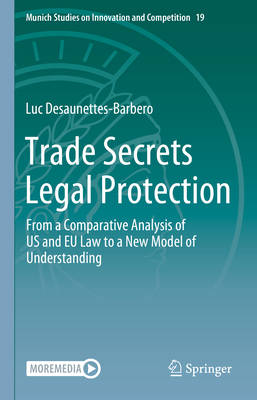
- Afhalen na 1 uur in een winkel met voorraad
- Gratis thuislevering in België vanaf € 30
- Ruim aanbod met 7 miljoen producten
- Afhalen na 1 uur in een winkel met voorraad
- Gratis thuislevering in België vanaf € 30
- Ruim aanbod met 7 miljoen producten
Zoeken
Trade Secrets Legal Protection
From a Comparative Analysis of Us and EU Law to a New Model of Understanding
Luc Desaunettes-Barbero
€ 168,95
+ 337 punten
Uitvoering
Omschrijving
Despite the economic relevance of trade secrets, their legal protection is not based on a robust theoretical corpus, and a large uncertainty remains regarding how they should be legally apprehended. The present book investigates the foundations of their legal protection by assessing its justifications and aims to define how this legal apprehension should be organized.
The book starts with a comparative analysis of the US and the EU legal frameworks. It demonstrates the parentship existing between the two systems of protection and highlights that the incremental structuring of trade secrets protection has led to legal systems lacking broad-based conceptual foundations. In both legal orders, trade secrets rely on blurred protection, formally anchored in unfair competition, the strength of which, however, comes closer to that offered by intellectual property law. In this convoluted architecture, the judiciary is required to play a decisive role, especially at the enforcement stage. However, the absence of clarity concerning the telos of trade secrets protection leads to legal uncertainty, potentially incoherent enforcement, and, all in all, to inefficient outcomes from a welfare perspective.
The book then explores a theoretical framework based on a distinction between two legal objects: the undertakings' secret sphere and secret pieces of information. Securing the undertakings' secret sphere appears as a condition for the competition process to happen in an economy working under structural uncertainty. It requires objective regulations enforced by public authorities. On the other hand, the legal apprehension of secret pieces of information should be considered as falling within the realm of immaterial goods regulation aiming to solve the deficit of marketability of this type of good. This might call - after conducting a careful policy trade-off - for the establishment of relative (i.e. inter partes) subjective rights.
The book starts with a comparative analysis of the US and the EU legal frameworks. It demonstrates the parentship existing between the two systems of protection and highlights that the incremental structuring of trade secrets protection has led to legal systems lacking broad-based conceptual foundations. In both legal orders, trade secrets rely on blurred protection, formally anchored in unfair competition, the strength of which, however, comes closer to that offered by intellectual property law. In this convoluted architecture, the judiciary is required to play a decisive role, especially at the enforcement stage. However, the absence of clarity concerning the telos of trade secrets protection leads to legal uncertainty, potentially incoherent enforcement, and, all in all, to inefficient outcomes from a welfare perspective.
The book then explores a theoretical framework based on a distinction between two legal objects: the undertakings' secret sphere and secret pieces of information. Securing the undertakings' secret sphere appears as a condition for the competition process to happen in an economy working under structural uncertainty. It requires objective regulations enforced by public authorities. On the other hand, the legal apprehension of secret pieces of information should be considered as falling within the realm of immaterial goods regulation aiming to solve the deficit of marketability of this type of good. This might call - after conducting a careful policy trade-off - for the establishment of relative (i.e. inter partes) subjective rights.
Specificaties
Betrokkenen
- Auteur(s):
- Uitgeverij:
Inhoud
- Aantal bladzijden:
- 501
- Taal:
- Engels
- Reeks:
- Reeksnummer:
- nr. 19
Eigenschappen
- Productcode (EAN):
- 9783031267857
- Verschijningsdatum:
- 11/06/2023
- Uitvoering:
- Hardcover
- Formaat:
- Genaaid
- Afmetingen:
- 156 mm x 234 mm
- Gewicht:
- 902 g

Alleen bij Standaard Boekhandel
+ 337 punten op je klantenkaart van Standaard Boekhandel
Beoordelingen
We publiceren alleen reviews die voldoen aan de voorwaarden voor reviews. Bekijk onze voorwaarden voor reviews.











